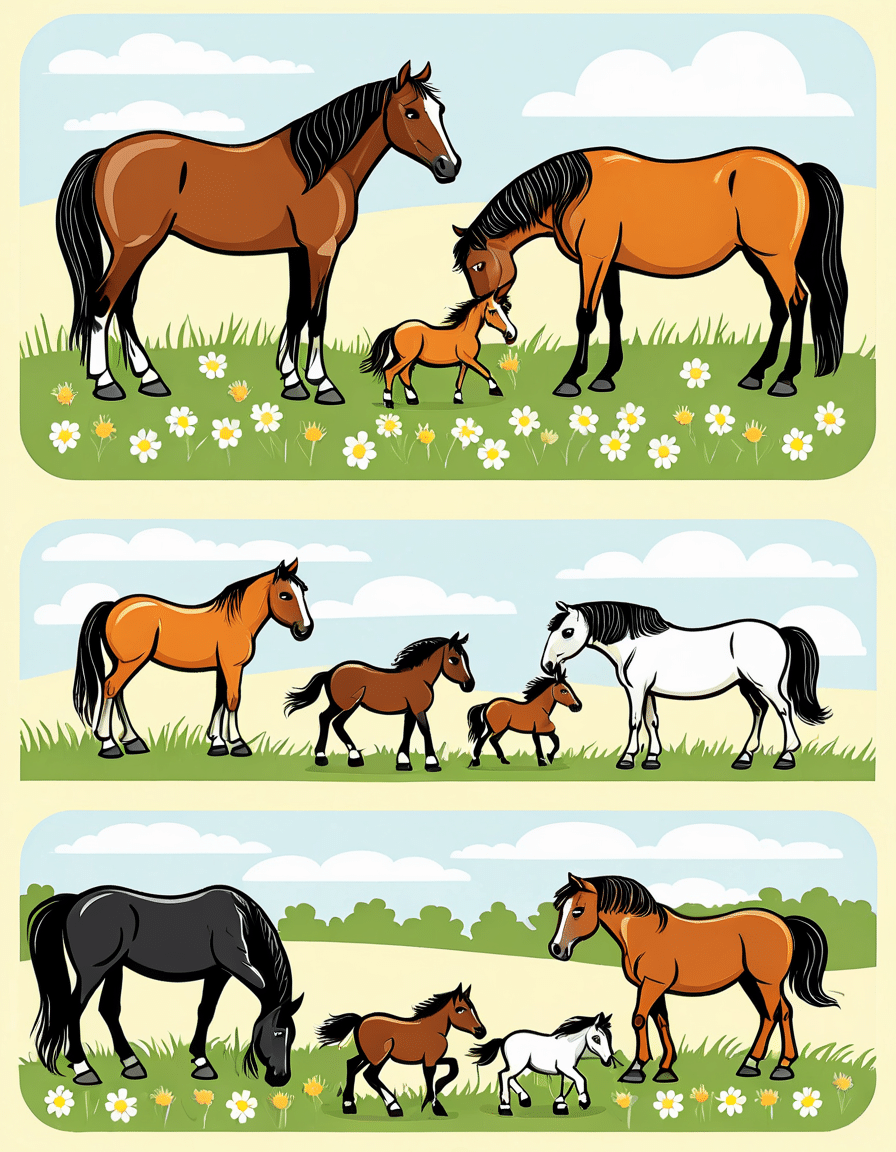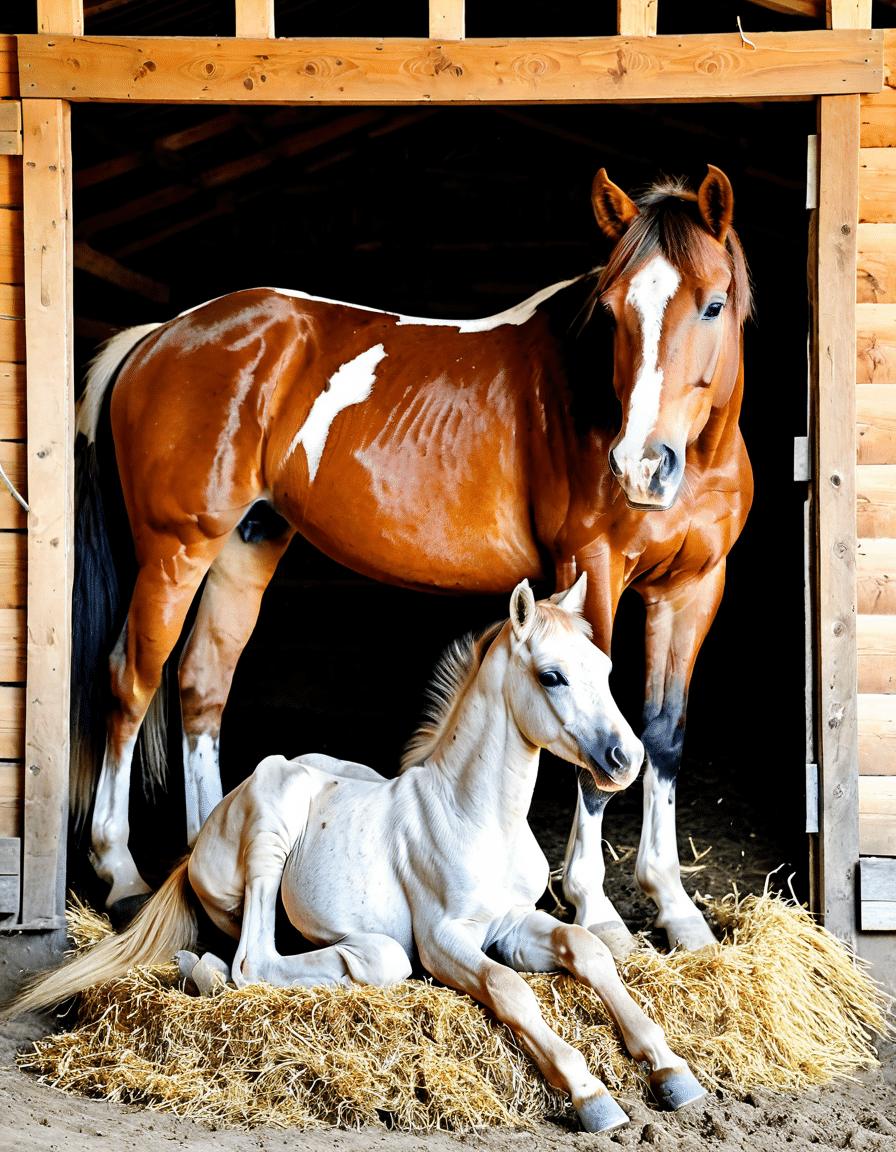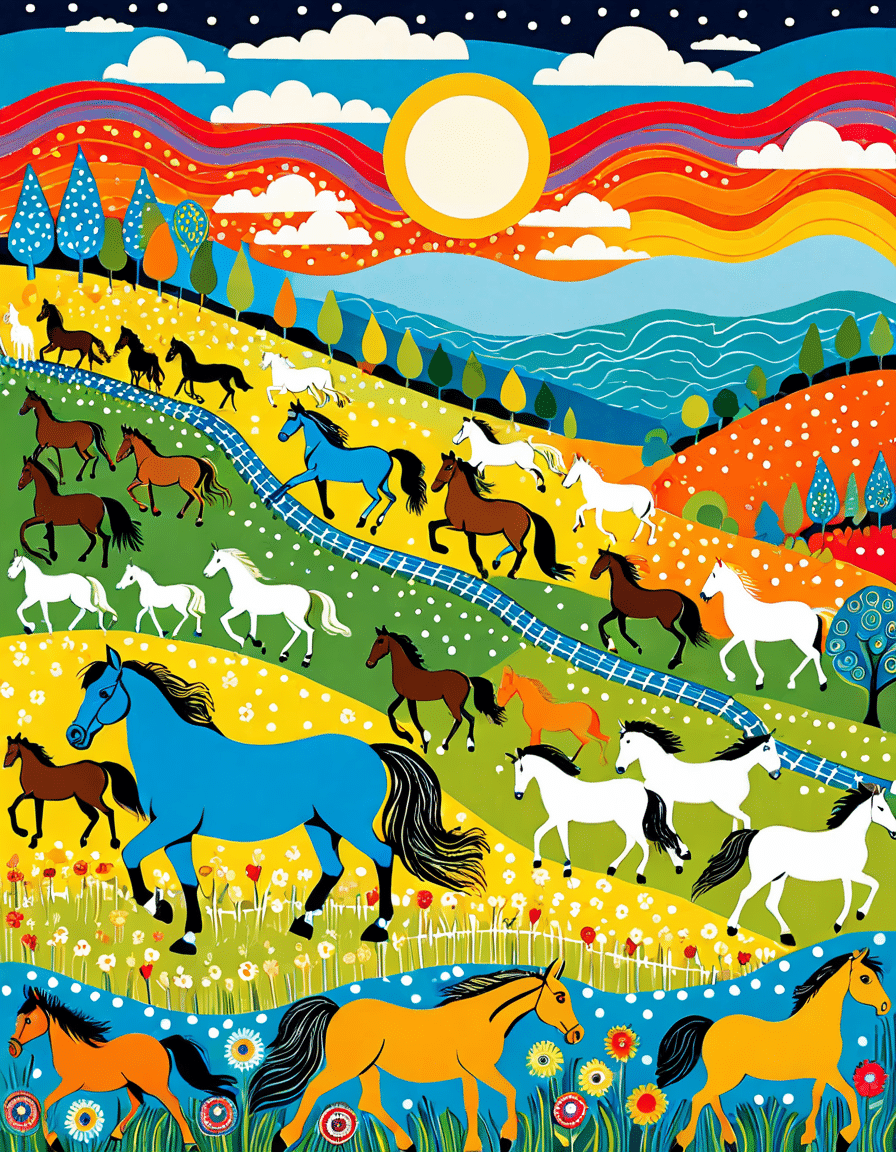Understanding horse gestation is crucial for every horse owner, whether you’re a seasoned professional or a first-timer. The horse gestation period is distinctly different from that of other farm animals and can be quite surprising. Lasting around 11 months—approximately 330 to 345 days—it’s longer than many expect, especially compared to the cattle gestation time, which usually clocks in at about 283 days for cows. Knowing the ins and outs of horse gestation helps owners prepare for the foaling process, ensuring the health and well-being of both mare and foal.
Being equipped with knowledge about horse gestation goes a long way. You’ll need to anticipate the diverse challenges that may arise during this time. The journey doesn’t just end with the birth of the foal; it continues into proper care and future training. In this article, we’ll delve into the secrets every horse owner should know about gestation, from nutritional needs to potential complications and more.
The Basics of Horse Gestation: Period and Duration
Horse gestation is a fascinating biological journey. The 11-month period is an essential time for maturing the foal inside the mare. Understanding this timeline helps owners track progress and prepare adequately for the eventual arrival of the new member of the family.
Due to this extended horse gestation period, there are several critical periods in which different stages of development occur. Early on, vital organs are developing, forming the foundations for a healthy foal. Later stages focus on weight gain and muscle development, crucial for a thriving foal. This extended period allows the foal to grow strong and healthy enough to thrive once born.
Knowing that the gestation period for cows is nearly two months shorter is interesting. Such a gap emphasizes the need for horse owners to be vigilant and proactive in monitoring their mares’ health throughout the entire gestation phase.

Top 5 Secrets Every Horse Owner Should Know About Gestation
1. The Importance of Nutrition During Horse Gestation
Nutrition plays a pivotal role during horse gestation. A well-balanced diet becomes even more critical once your mare becomes pregnant. Pregnant mares typically need increased caloric intake to sustain both their health and the developing foal. Quality forage, combined with specially formulated feeds like Triple Crown’s Low Starch Formula, can significantly impact the quality of the foal born.
Moreover, monitoring vitamin and mineral intake is essential. Ensure your mare gets sufficient calcium, phosphorus, and selenium, which are vital for both her health and the foal’s development. Poor nutrition can lead to complications later, impacting not just the mare but the future vitality of the foal.
Additionally, it helps to avoid poorly balanced feeds or those high in starch and sugar as they can lead to health issues like gestational diabetes in mares, making a nutritionally sound diet critical.
2. Foal Development Stages: What to Expect
As the horse gestation progresses, it’s fascinating to witness the various developmental milestones of the foal. In the first trimester, organ systems begin forming. By mid-gestation, the basic anatomy features become recognizable, and the foal begins to grow at a rapid pace.
Veterinary check-ups can help monitor this development. For instance, facilities like Rood & Riddle Equine Hospital recommend regular ultrasounds to observe the fetal health. These imaging sessions are valuable for assessing whether the foal is on track in terms of growth and development.
As the foaling date approaches, expect to see significant changes. In the last trimester, muscular and skeletal development ramps up to prepare the foal for life outside the womb. Owners knowledgeable about these stages can tailor their care to align with the foal’s needs.
3. Common Complications: Be Prepared
Even with the best of care, complications can arise during horse gestation. Placentitis, for example, impacts the placenta’s ability to nourish the foal and can lead to distressing outcomes. Another concern is twin pregnancies, which, while rare, can result in stillbirth or the demise of one of the foals.
Being cognizant of a mare’s behavior is crucial. Any changes in eating habits, playfulness, or restfulness can signal potential complications. Regular veterinary check-ups are vital as they provide opportunities to monitor for these issues early on and prevent complications before they escalate.
Proactive management can save both you and your mare a lot of heartache. The cost of treatment or loss of a foal often outweighs the expense of routine veterinary visits and testing.
4. Stress Factors: The Impact of Environment on Gestation
Did you know that stress can profoundly affect horse gestation? A mare’s environment should provide a sense of security and peace. Stressors, such as loud noises or challenging surroundings, can trigger anxiety in a pregnant mare, potentially influencing fetal development.
Creating a calm, stable environment is key. Sticking to routines can help reduce the sense of upheaval or anxiety that mares may experience. Facilities like Horse Haven emphasize the need for consistent care to maintain the physical and emotional well-being of their residents.
Taking steps to reduce stress, like providing a quiet space away from busy barn activities or unpredictable animals, can yield positive results. Remember, a relaxed mare is more likely to have a successful pregnancy.
5. Comparing Horse Gestation to Cattle: Lessons Learned
When examining horse and cattle gestation, parallels and lessons emerge. While cows have a gestation period of around 283 days, horse gestation is notably longer. These differences highlight the unique care requirements of each species.
One key takeaway from cattle care is the importance of maintaining a body condition score (BCS). This similar approach can benefit horse owners as they strive to ensure their mares are healthy throughout their gestation. Keeping an eye on the mare’s body condition helps in planning the nutritional needs relevant to the foal’s growing requirements.
Moreover, principles like specialized feeding for fetal development, often used in cattle management, can serve as a great guideline for horse owners too. The continued examination between livestock care helps owners glean useful insights that benefit both species.

The Long-Term Journey: Preparing for a Healthy Foaling
As your mare’s horse gestation period nears its conclusion, preparation is paramount. Setting up a clean, comfortable foaling area will ensure both mother and foal’s immediate needs are met during labor. Access to veterinary help should be readily available.
Always be prepared for what to expect during labor. Knowledge of typical foaling signs can help you assist your mare effectively. Various resources are available, such as those offered by the American Association of Equine Practitioners, to provide guidance on foaling processes and postpartum care for both mare and foal.
Being proactive and knowledgeable during horse gestation promotes a smooth transition from pregnancy to the joyous arrival of your new foal. Understanding these essential secrets will enhance the quality of care you provide, making a significant difference in the health outcomes for both mare and foal.
In sum, the journey of horse gestation teaches us invaluable lessons that go beyond just caring for the mare. It opens the door to understanding animal health as a whole and the importance of comprehensive care in fostering healthy, vibrant livestock. By paying attention to these significant aspects, horse owners can celebrate not just the birth but a future filled with potential.
Horse Gestation: Fascinating Facts Every Owner Should Know
Understanding the Duration of Horse Gestation
Horse gestation lasts about 11 months, which is quite a journey for both the mare and her future foal. Interestingly, this lengthy period is somewhat reminiscent of human pregnancy, although horses can give birth as early as 320 days or as late as 380 days. This variability can be influenced by many factors, including breed and environmental conditions. Did you know that the average foal weighs around 100 pounds at birth? That’s quite the bundle of joy! And while we might not think about it often, this growth is akin to how young puppies and kittens depend on their mothers in different stages of their lives. Similar to how Siamese cat Breeders near me emphasize the importance of genetics, the foal’s genetic makeup is determined long before birth.
The Importance of Nutrition During Horse Gestation
During horse gestation, a mare’s nutritional needs significantly increase. She needs extra calories, protein, and minerals to support her growing foal. That’s right—keeping tabs on her diet is key, or you might end up like a chicken looking for chicken tibia bones while trying to find the right feed! Plus, just like those looking into buying Your first home need to understand their options, horse owners should familiarize themselves with the nutritional requirements that come with pregnancy. If you’re scratching your head wondering what to feed her, seek advice from your veterinarian or equine nutritionist for a personalized plan.
Fun Facts About Foals and Their Development
Foals are born with an incredible instinct to stand and walk shortly after birth, often within the first hour. Now, that’s impressive! They need to get up quickly to nurse and bond with their mother. In fact, within a few days, foals can run, which is essential for their survival in the wild. Did you know that foals and puppies have this in common? Just like puppies’ growth stages, a foal’s early development is critical for its health and wellbeing, much like how pet owners must learn about Pitbull aging to provide the best care. But hey, every animal owner should remember to take a break—maybe Buffers need To take a nap sometime today to recharge and keep up with their furry companions!
All in all, horse gestation is an adventure full of wonders. Just as 2 Fast 2 Furious reminds us that life’s challenges can be thrilling, caring for a pregnant mare brings its own excitement and rewards. Knowing these fun facts can help you bond more deeply with your equine friends and prepare for the joys of welcoming a new foal into your life.



